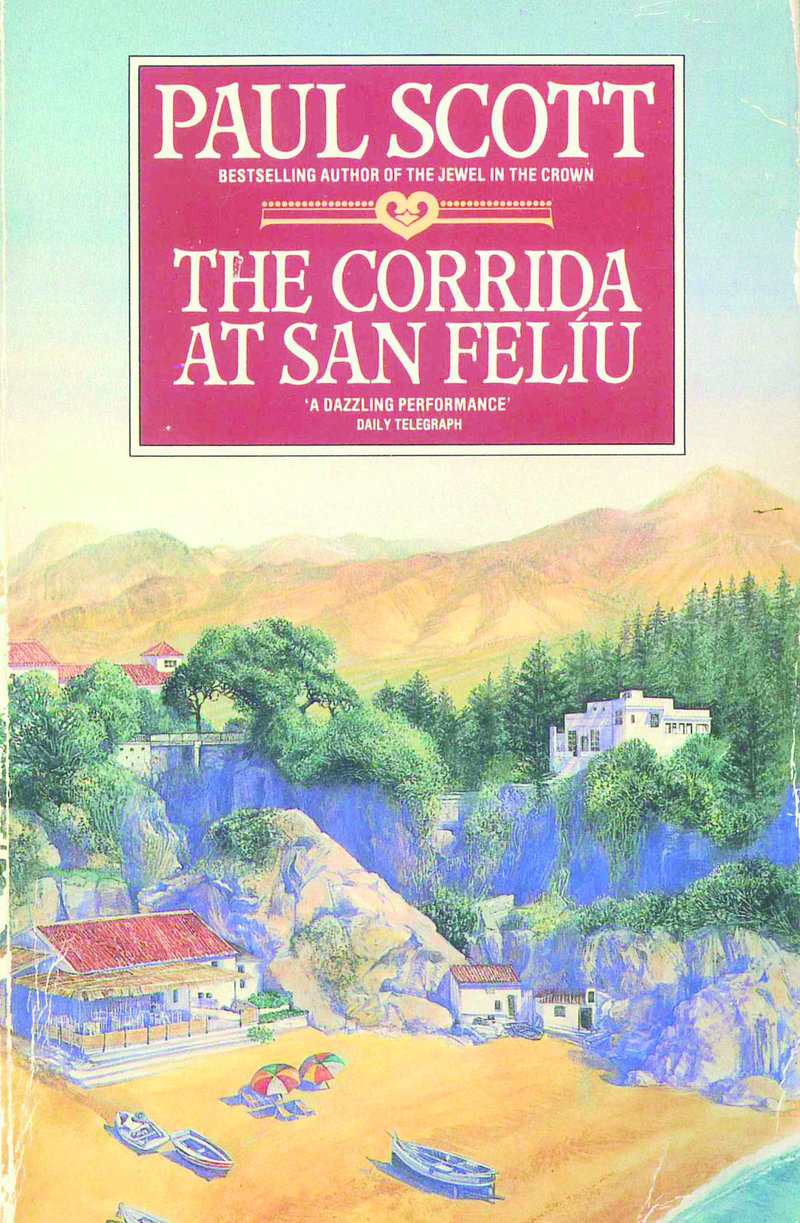Success too late Elderly angst
Unlike Colm Tóibín's The South or Lucia Graves' Memory House, the first two books discussed in this series on fiction in English about Catalonia, The Corrida at San Feliu is not wholly successful
Scott's ambitious novel consists of a series of fragments on themes of betrayal and inability to communicate. Daunting in its structure, yet it is also a very readable book, for many of the fragments are brilliant. And Paul Scott, even here at his most obscure, is a writer of psychological depth and rich prose.
The novelist Ed Thornhill dies with his wife Myra when a bridge over the River Ter collapses in an autumn storm as he drives back at night to the Catalan coastal resort of 'Playa de Faro', where the couple have been staying for 6 months. No-one knows whether the deaths were a form of suicide/murder or foolhardiness, spurred by Thornhill's desire to get back to the notes for his novel.
Words fail
The rest of The Corrida at San Feliu consists of these disparate notes: one story set in Africa, two in India, memories of childhood, an imaginary couple arriving in Playa de Faro and then the account of Thornhill's own troubles in Playa de Faro.
In nearly all Thornhill's fragments, there is an elderly man and his much younger wife, who turn up somewhere in disgrace or in deep trouble. They had married for love at the cost of someone else, causing suicide or scandal. The stories are told from different points of view: the young woman, the lover or the older man, who give their distinct “versions of the truth”. Now love has expired and the couples survive, understanding each other, but desperately non-communicative.
All these notes and stories point to the 'real' story. Thornhill is trying to write about his own situation: the second half of the novel analyses his own disastrous triangle. Sixty years old, he is driven crazy by watching his beautiful 40-year old wife flirting on the beach with a “bronzed godling”. The emotional and sexual tension Scott evokes so well makes the novel like one of teenage angst, but transferred to an elderly man.
The least satisfying part of the novel is its climax, when Thornhill, trying to work out his obsessions, attends the corrida at Sant Feliu. And this is not due to any prejudice against the bullfight (now banned in Catalonia), but rather Scott's clumsy symbolism and failure to tie together his themes.
Paul Scott does not fit comfortably into the now outmoded sub-genre of Anglo-Saxon writers on Spain fascinated by bull-fighting -Kenneth Tynan, Hemingway, Barnaby Conrad. He does indeed describe in lengthy detail the corrida, but with little reverence. He observes its downside: details of mules, an ageing peon in torn tights, the bull's point of view (with original inventiveness), the vendors of cushions. Thornhill himself, blocked writer, alcoholic and cuckold, feels himself in the role of the bull. Confused and close to death.
Fishermen and tourists
One of the greatest attractions of the novel is not literary: it catches a moment of change, telling us what the Costa Brava was like 53 years ago, when foreign holiday-makers could hear no Catalan on the street and might easily not have known they were in Catalonia. Scott writes extremely well of the boats, the bars, the beach. His vocabulary is precise and his observation, acute (he makes you remember the smell of squid cooking or bougainvillea). It reminds me of a rather different novel, Roberto Bolaño's The Skating Rink, which also features an obsessive observer on his Costa Brava terrace, so you get all the action down in the town, at the same time as the watcher's anguish.
Ritually, young men play football on the beach, moving closer and closer to a tourist lying face down in her bikini, until the ball scuffs up sand and one of the young men apologises profoundly and strikes up conversation. The first tourists were arriving for sun, sex and cheap wine. In 1962 in Playa del Faro fishermen lived still in brief equilibrium with tourists: a balance long ago skewed in favour of tourism.
Paul Scott's life was not too happy. Self-doubt, bad health, money worries, loneliness all assailed him. Born in London in 1920, he died of cancer, aged just 57, in 1978.
Little read today, he was a novelist well-regarded by critics, but with scant commercial success up to and including 1964, the year of his most experimental and 'difficult' book, The Corrida at San Feliu.
His early twenties found him in the army in World War II, first as a private and then commissioned to captain. He was stationed in India and his letters tell how its poverty and colour infected him with a lifelong passion for the country.
After the war he worked as an accountant for publishing firms, then for 10 years as a literary agent. He was also publishing his own poetry, radio plays, reviews. Johnny Sahib, the first of 13 novels, came out in 1952. In 1960, he boldly left his job and became a full-time writer.
After The Corrida at San Feliu was well received, but again sold little, he took a fateful decision. He flew to India and began to write four novels that have become one of the definitive analyses of the British in India. With a huge cast of characters, including Indians and British of all social classes, the Raj Quartet, as the four novels were to be known, triumphantly expresses Scott's lifelong themes of class resentment, faithful and betrayed love and repressed homosexuality.
In his last year of life, 1977, he won the Booker Prize with Staying On, an account of an ageing English couple who decided to stay in India after Independence. A 1980 TV film of Staying On was a hit and led to the adaptation of The Raj Quartet with the title The Jewel in the Crown. The popular TV mini-series was attacked by Salman Rushdie, and others, for its Raj nostalgia and racial prejudice (the rape plot, Rushdie said, pandered to ideas of “lust-crazed wogs”). Looking back, as Scott was, there is always a certain nostalgia; but Scott's novels are clearly anti-racist. He had died, though, and could neither enjoy his books' TV fame, nor respond to his critics.




